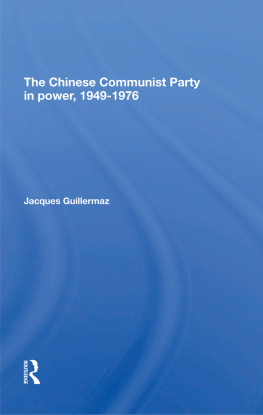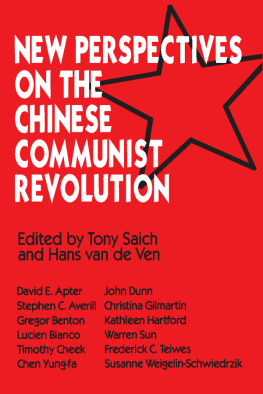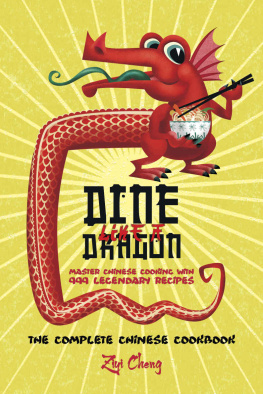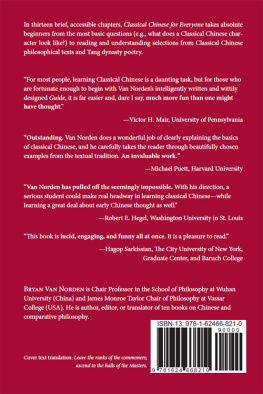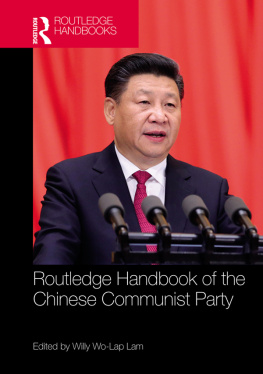THE FORMATION OF THE CHINESE COMMUNIST PARTY
THE FORMATION OF THE CHINESE COMMUNIST PARTY
Ishikawa Yoshihiro
Translated by Joshua A. Fogel

Columbia University Press
New York
Columbia University Press
Publishers Since 1893
New York Chichester, West Sussex
cup.columbia.edu
Chgoku kysant seiritsu shi (original Japanese edition) Yoshihiro Ishikawa 2001
Copyright 2013 Columbia University Press
All rights reserved
E-ISBN 978-0-231-50416-4
COVER DESIGN: Martin N. Hinze
Library of Congress Cataloging-in-Publication Data
Ishikawa, Yoshihiro, 1963
[Chgoku kysant seiritsu shi. English]
The formation of the Chinese Communist Party / Ishikawa Yoshihiro ; translated by Joshua A. Fogel.
p. cm.
Originally published in Japanese as: Chgoku kysant seiritsu shi, 2001.
Includes bibliographical references and index.
ISBN 978-0-231-15808-4 (cloth : alk. paper) ISBN 978-0-231-50416-4 (electronic)
1. Zhongguo gongchandangHistory. 2. CommunismChinaHistory.
I. Fogel, Joshua A., 1950 II. Title.
JQ1519.A5I8213 2013
324.251075dc23
2012002614
A Columbia University Press E-book.
CUP would be pleased to hear about your reading experience with this e-book at
References to Internet Web sites (URLs) were accurate at the time of writing. Neither the author nor Columbia University Press is responsible for URLs that may have expired or changed since the manuscript was prepared.
Contents
In 2011, the first national congress of the Chinese Communist Party (CCP) celebrated its ninetieth birthday. I am deeply honored that, through the laborious efforts of my close friend Joshua Fogel, this book is being published. The original Japanese edition appeared in 2001. Over the course of the years since, Chinas political and economic presence has become immense throughout the world, and research on Chinas recent history and the history of the Chinese Communist Party has undergone great changes. There have also been a number of developments in China concerning the founding of the CCP. Among them was a controversy occasioned several years ago by the publication of the Chinese translation of this book.
After this volume first appeared in Japanese, I published an essay introducing its main points in a Chinese journal, and in the summer of 2002, Zhongguo shehui kexue chubanshe (Chinese Social Sciences Press) proposed publication of a Chinese translation. Through the devoted work of Mr. Yuan Guangquan, the Chinese translation was completed in March 2003, but because of delays in the process of publication approvals on the Chinese side, it would be three more years before the book appeared in print. Although the requisite approval for publication took an unexpectedly long period of time and despite the fact that the book includes many points that differ from the official account of the CCPs history, ultimately the Chinese edition was indeed happily published as a faithful translation without any revisions or deletions.
The Chinese edition, however, contained a number of major problems. First, after the long process of publication approval, it was published almost immediately, and neither the author (myself) nor the translator (Mr. Yuan) had the opportunity to proofread the text. Second, it was published without an introduction to the Chinese edition, which had been promised to us. Third, despite having sent the publisher a subject index, the work was published without any index at all. I was informed of its publication in China by the publisher shortly after its appearance, and I traveled to Zhongguo shehui kexue chubanshe in Beijing in February 2006 and saw the Chinese edition fresh off the press. I was astonished to see that there were not only numerous garbled and miswritten characters but no index either. At that point, though, it was already too late. Thus, as a work of scholarship, the Chinese edition is a highly unsightly affair.
Despite such deficiencies, the Chinese edition caused quite a response. As far as I have been able to tell, over twenty review essays have appeared in Chinese newspapers and scholarly journals thus far, and a number of research reports concerned primarily with commenting on my book have been carried out by conferences or workshops regarding CCP history. Many of these have in general offered positive assessments of the detailed investigations and new insights the book seeks to present, although the somewhat aggressive reviews that attacked me personally were unexpected. One such representative case was a featured book review covering an entire page of Guangming ribao (August 28, 2006), a daily newspaper aimed at intellectuals. This review was actually comprised of three essays that all essentially made the same point. In the book, I stated that the man responsible for introducing Marxism in China was Chen Puxian, who wrote under the pen name Yuanquan. Each reviewer felt that I was taking the credit for identifying this individual, who had been named several years before in China. They accused me of plagiarizing their research, which reflected badly on my character and conscience as a scholar. Later essays that they published repeated the accusation.
Readers will note that nowhere in this book do I claim to be the first person to discover that Yuanquan was Chen Puxian. In fact, in the Afterword, I discuss the sequence of events that piqued my interest in the history of the spread of Marxism in China. I mention that uncovering the identity of Yuanquan while I was a graduate student (19881989) was an important turning point, but this merely goes back to the starting point of my own research. Apparently, it was my statement in The three reviews carried in Guangming ribao transposed the language of this other reviewer to make it seem as though I was claiming all the credit.
Fortunately, it would seem, the voice of rebuttal quickly emerged among Chinese scholars, who stated that this kind of personal slander based on distortion exceeded the boundaries of commentary on a work of scholarship. Such comments express the emotional resistance to having a Japanese author rewrite such sacred historyas it is in China in a certain senseof the formation of the Chinese Communist Party. As far as I am concerned, I would only hope that the new views and interpretations offered in my booknot just the issue of Yuanquanwould be discussed in a more equitable manner.
For the majority of readers of the English edition of the book, many of the individual historical facts analyzed herein may not as yet be known. Thus, this book may seem in content to be no more than a trivial string of textual analyses from which the significance is difficult to assess. However, the gist of this studyan effort to grasp the origins of the Communist movement in China in the midst of the contemporaneous international environmentshould, I believe, be understood best by English-language readersthose who have the best opportunity to do an unbiased reading of the history of the Chinese Communist Party.
In the ten years since the original Japanese edition of this book was released in 2001, several new documents on the founding of the CCP have been made public, but I have only been able to supplement the English text with these new materials minimally. The content and views expressed in the book have not, due to newly discovered documents, been compelled to undergo a wide-ranging revision. I have corrected a number of writing errors, misprints, and factual misunderstandings that cropped up in the Japanese text, but that has not entailed a reevaluation of my views or my understanding overall. In other words, despite the passage of ten years and the debates that followed the publication of the Chinese edition, I am confident that the views expressed in this book remain valid and do not require any fundamental change. On one point, however, I would like to offer a correction on the basis of a Comintern document made public shortly after the first edition of this book was published. This is a new document recounting the participation of Chinese delegates to the third congress of the Comintern, as described in
Next page

